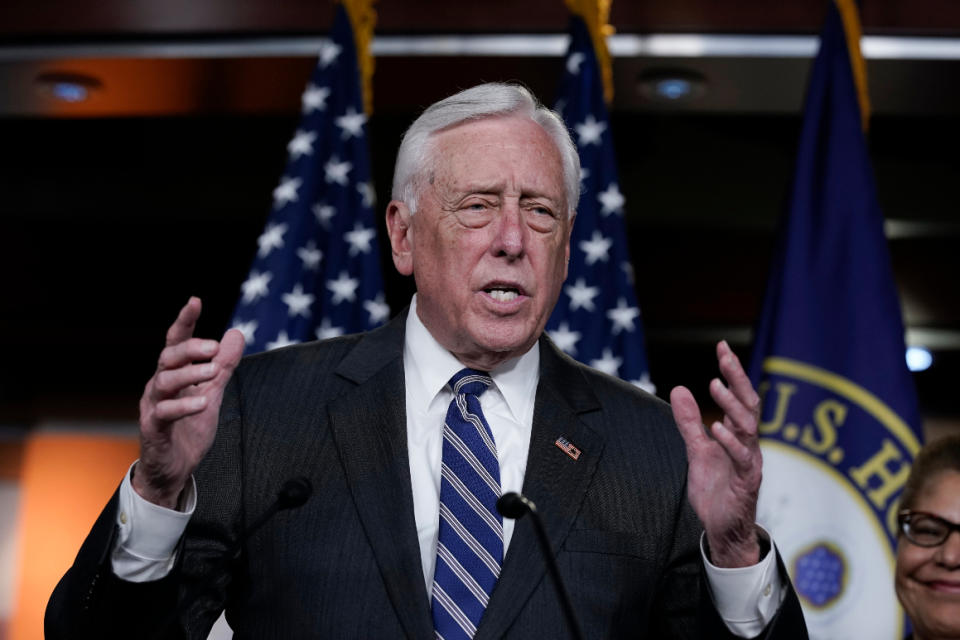House approves stopgap spending measure to avert shutdown
The House on Tuesday overwhelmingly voted to extend federal funding through Dec. 11, while punting the threat of a government shutdown until after the presidential election.
The bipartisan vote comes hours after House Speaker Nancy Pelosi and Treasury Secretary Steven Mnuchin clinched a last-minute deal to include billions in nutrition assistance and trade relief payments for farmers, capping weeks of contentious negotiations.
The short-term funding fix now goes to the Senate, where it’s expected to easily pass before the Sept. 30 deadline. If signed by President Donald Trump, it would also postpone a slew of contentious funding fights — from the border wall to the renaming of Confederate monuments at military installations — to the lame-duck session of Congress.
“We have an agreement that will keep the government functioning for the people,” House Majority Leader Steny Hoyer (D-Md.) said on the floor, recapping the back-and-forth of negotiations in recent weeks. “There was a lot of to and fro-ing, a lot of people wanted this, a lot of people wanted that, a lot of people didn’t want this... This is the best we have, so we need to take it.”
The bipartisan accord represents a remarkable turnaround after negotiations collapsed late last week after Democrats objected to the GOP’s demands for trade relief payments, prompting some lawmakers and aides to privately worry that Washington was coming perilously close to the Sept. 30 deadline with no agreement to keep the government open.
Congressional leaders relaunched funding talks on Tuesday, scrapping plans to vote on the Democrats’ own version of that bill the same day. Ultimately, Hill leaders agreed to include $8 billion in nutrition assistance — four times what Democrats had originally pushed for — in exchange for tens of billions of dollars in farmer trade relief payments requested by the White House.

Democrats also secured key pandemic-related nutrition extensions, including a year-long extension of a program that allows families with school-aged children to buy groceries during the pandemic. Pelosi said in a statement that the farmer aid includes guardrails to ensure that the money doesn’t bail out oil refiners, although the Trump administration already said this week that the funds wouldn’t flow to the oil industry.
The deal on a funding measure comes as Democrats and Republicans remain at a stalemate in the broader negotiations over exactly how to deliver more aid to millions of Americans suffering from the economic fallout of the pandemic.
“Let’s be clear, the fact that we are passing a CR without having already passed an additional Covid stimulus bill represents cruelty and gross incompetence of the highest order,” Rep. Debbie Wasserman Schultz (D-Fla.) said on the floor.
Some lawmakers said that progress on the funding deal — while more limited in scope — could help spark goodwill between Democratic and GOP leaders on more coronavirus relief legislation.
Rep. Kay Granger (R-Texas), the top Republican on the House spending panel, said she was “hopeful that the Congress and the administration will continue this spirit of bipartisanship as we continue working towards a deal to help other industries,” specifically citing airlines.
Both Democrats and Republicans had been eager to reach a deal to avert last-minute drama, though the two parties squabbled for weeks over various funding and policy provisions in the temporary funding bill.
Pelosi had originally planned to push through her party's version of a short-term spending fix, despite fierce GOP objections over the lack of aid for farmers amid the ongoing trade war. But Pelosi told her caucus Tuesday morning that she was again in talks with Republicans.
A deal had appeared to be coming together last Friday, including tens of billions of dollars in farmer payments that Republicans sought in exchange for $2 billion in pandemic-related nutritional assistance that Democrats wanted.
But last-minute objections to the trade relief — including Democratic concerns that the president is leveraging the money to boost his reelection chances — tanked the talks. House Democrats ultimately released legislation without the GOP demands, drawing the ire of McConnell, who tweeted that it “shamefully leaves out key relief” for farmers.
Earlier last week, Democrats had dropped requests to extend the Census Bureau’s Dec. 31 deadline to turn over apportionment data used to divvy up House seats to the president — potentially punting the final handling of census data to Democratic nominee Joe Biden if he’s elected this November. Democrats had also failed to secure $3.6 billion in election security grants.
Heather Cayle and Helena Bottemiller Evich contributed to this report.

 money
money 